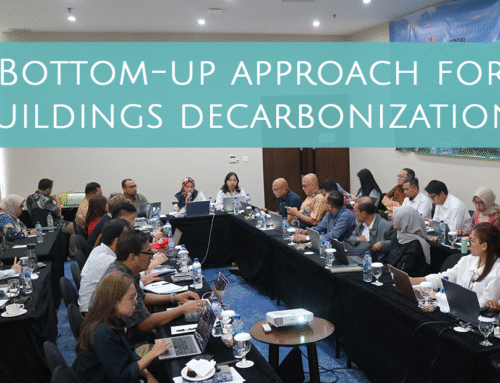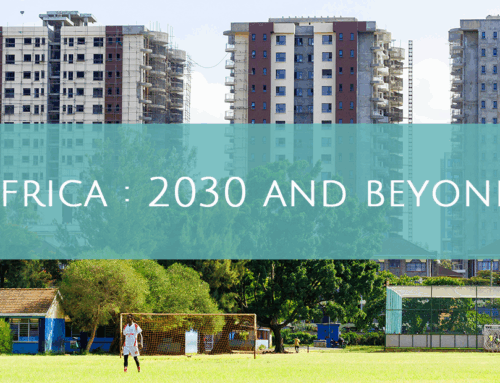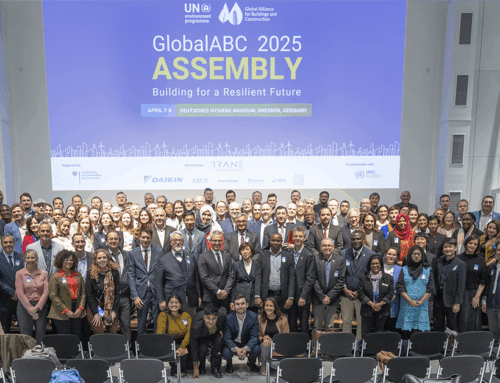By: Dr Peter Graham
The first ever ‘Global Forum on Buildings and Climate’, an initiative of the United Nations Environment Programme (UNEP) and the Government of France to advance the ‘Buildings Breakthrough‘ Agenda, was held on 7th and 8th March in Paris. Since July last year, a group of experts, including me, have contributed to drafting a declaration for Ministers of Construction from all countries to sign, committing to a range of actions to decarbonize the built environment and promote equitable access to sustainable buildings in every country. The ‘Declaration de Chaillot‘ was signed and adopted by 70 countries in Paris, on 8th March.
The declaration is significant because Ministers recognize that progress on decarbonizing the built environment is not sufficient to keep global warming below 1.5 degrees. By implication this reaffirms a commitment to limit global warming to 1.5oC. The Declaration sets out a common set of priorities for climate actions. In signing the declaration the ministers committed to the following key developments:
Key Developments
GBPN has been admitted as a supporting initiative for the Buildings Breakthrough Agenda, meaning that signatories can request GBPNs support for climate action and policy reforms aiming at achieving the Paris Agreement goals.
Declaration de Chaillot Signing: The declaration signed by 70 countries signifies a collective commitment to actions aimed at decarbonizing the built environment and promoting sustainable building practices globally.
Challenges Acknowledged: The signatory ministers acknowledged the pressing challenges posed by climate change on the built environment, particularly in developing countries and urban areas. They highlighted the inadequate progress in sustainable building initiatives and the widening gap between current practices and the goals of the Paris Agreement.
Commitments Made: The ministers pledged to implement various measures outlined in the Declaration de Chaillot, including the implementation of roadmaps, development of regulatory frameworks, financial incentives, and promotion of sustainable building materials. They also emphasized collaboration among stakeholders and the importance of data sharing and dissemination of best practices.
Establishment of Intergovernmental Council: The signatories announced the establishment of an “Intergovernmental Council for Buildings and Climate,” coordinated by the GlobalABC to oversee the implementation of these commitments. This council will monitor progress and facilitate cooperation among nations and stakeholders.
Impact and Significance
Operational Implementation of the Paris Agreement: The Declaration de Chaillot represents a significant step towards operationalizing the goals of the Paris Agreement within the building and construction sector.
Broad Stakeholder Engagement: Notwithstanding SE Nations’ minimal participation, the participation of over 1800 stakeholders at the forum demonstrates increasing support for sustainable building initiatives across the value chain. This collective effort is crucial for mobilizing financing and sharing solutions to address climate challenges.
Promoting local know-how: Capacity-building initiatives and strengthening local knowledge can empower local governments and communities to contribute meaningfully to building decarbonization and climate mitigation efforts.
Diplomatic and Climate Action Implications: The declaration will enhance international cooperation and strengthen climate action efforts at local, national, and global levels. It provides momentum for achieving the targets outlined in the Paris Agreement and sets the stage for the submission of ambitious National Determined Contributions in 2025.
The closing remarks from UN Habitat reinforce the centrality of tackling the housing crisis. Demand will only grow and sustainable architecture is now firmly a global need. This is a good start, but we have more work to do to see these commitments achieved and all countries come on board. There is very little representation of South-East Asian countries among the signatories. Notable is the current absence of Indonesia and India in this initiative. As GBPN supports climate policy for buildings in both countries, we know that they have significant progress to share, and can take leadership roles in their regions. Hopefully as this initiative progresses we will see these significant countries join the global effort to ensure that “Near-zero emission and resilient buildings are the new normal by 2030”.1
More details are available in this UNEP press release.
Also participating at the Forum was Mugure Njendu, GBPN Program Development Consultant, Africa who spoke at the panel discussion on collaboration for fair and inclusive approaches to skills development for just transition.
Watch video here
1 The Buildings Breakthrough Target Agreed and Launched at COP28, Dubai 2023.
Share This Story, Choose Your Platform!
Stay in touch with how we’re transforming the buildings sector
GBPN runs innovative building policy reform programs in key regions around the world that aim to tackle the climate emergency by decarbonising the buildings sector. Stay up to date with our newsletter.
Stay in touch with how we’re transforming the buildings sector
GBPN runs innovative building policy reform programs in key regions around the world that aim to tackle the climate emergency by decarbonising the buildings sector. Stay up to date with our newsletter.








